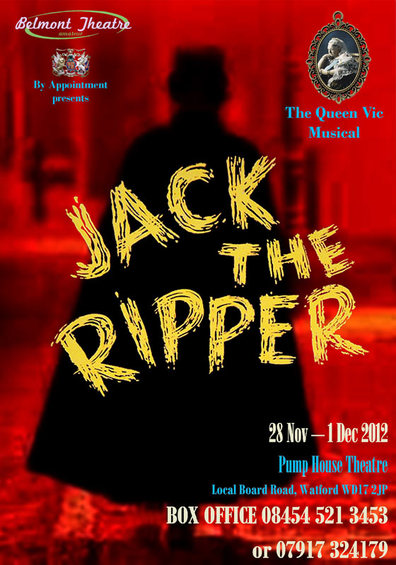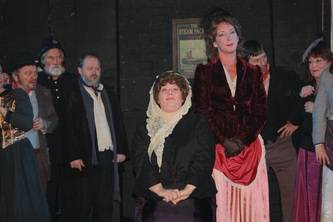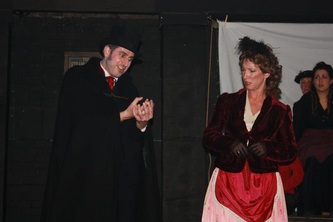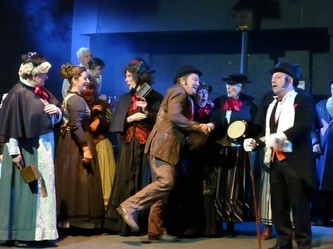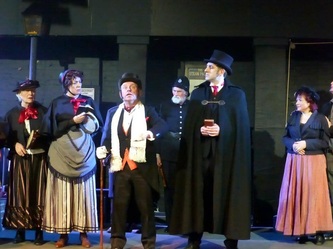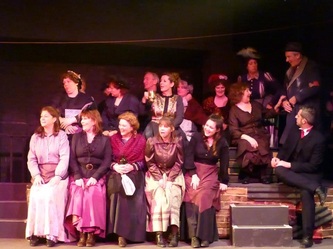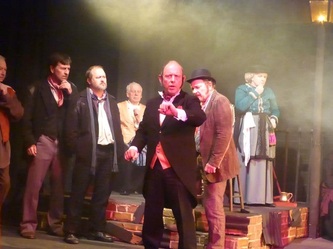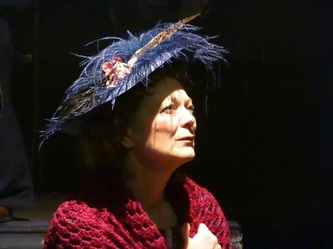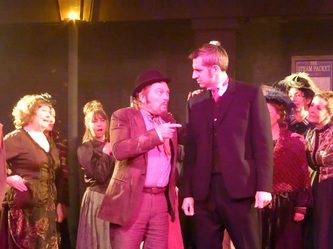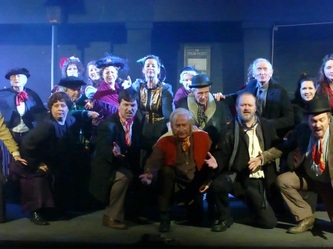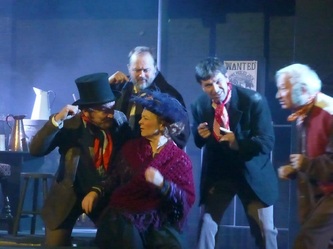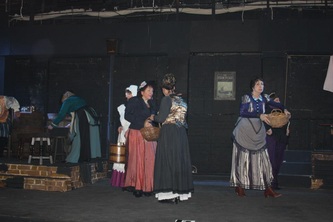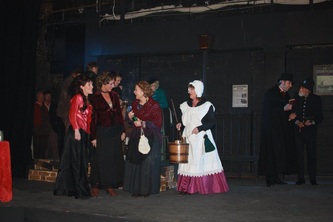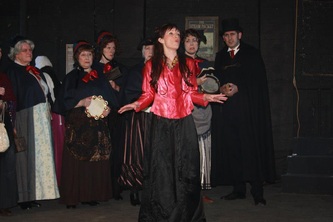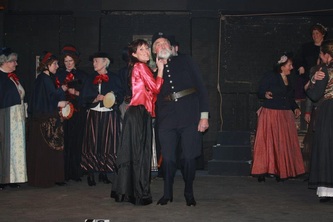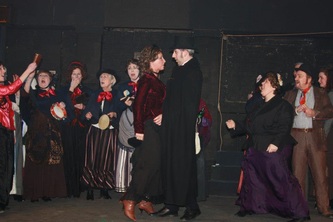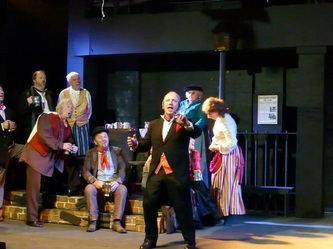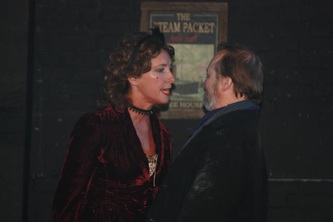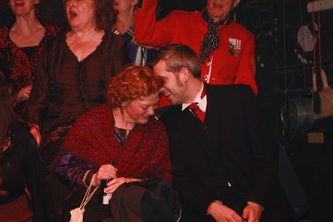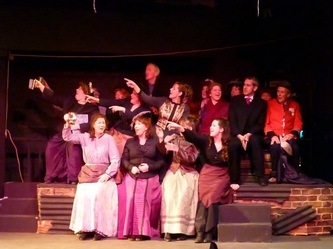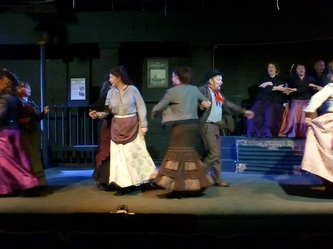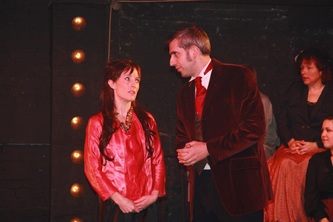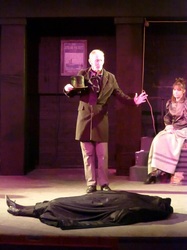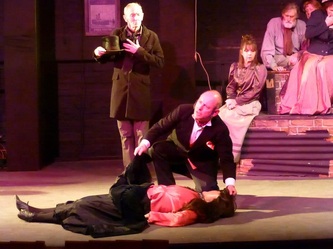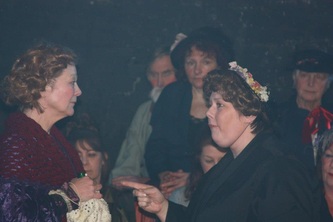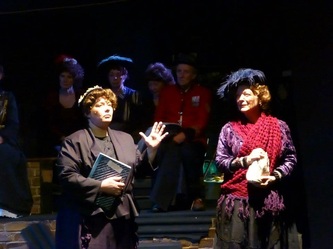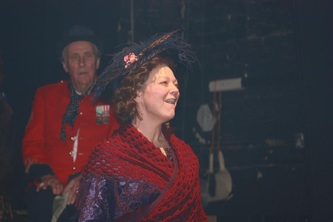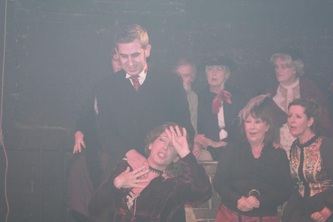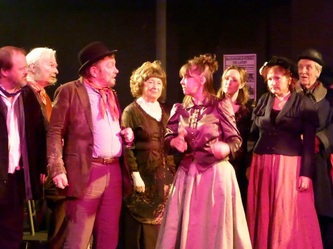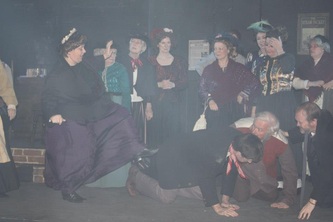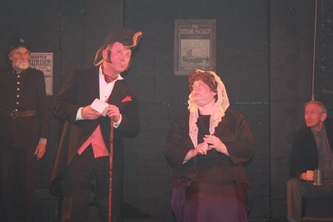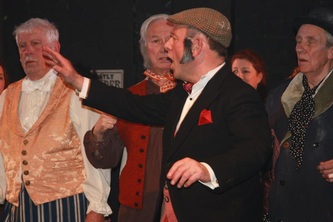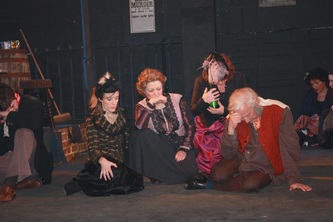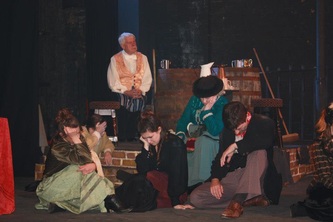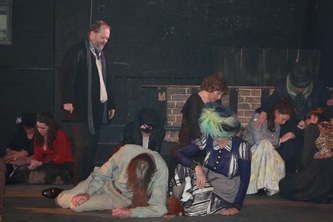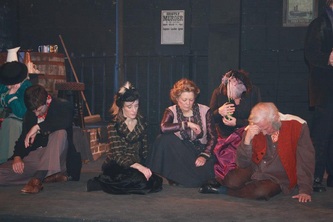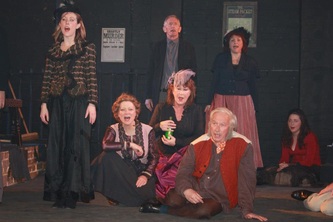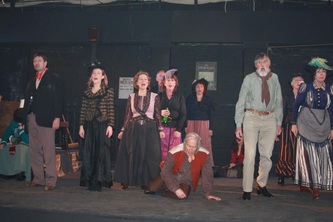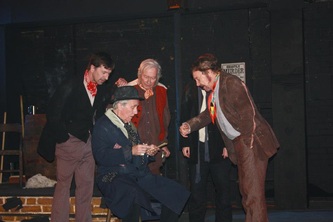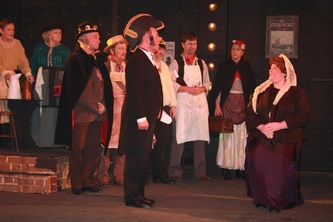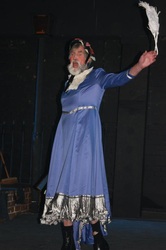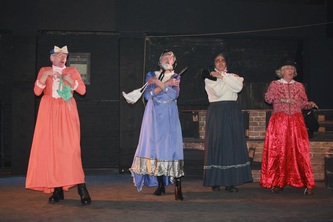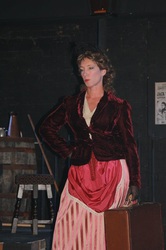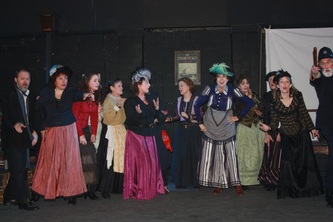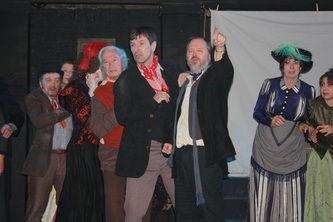Jack The RipperWritten by: Ron Pember and Denis de Marne
Directed by: Mike and Maggie Morrow Performed at the Pump House Theatre, Watford. 28th November to Saturday 1st December 2012 This colourful, large-cast musical production re-creates, in a light-hearted and comic way, an atmospheric commentary on the savage Ripper murders of 1888 in the squalid Victorian East End of London. This bawdy show, written in 1974 by Ron Pember and Denis de Marne, was originally staged at The Players Theatre before moving to the Ambassadors Theatre in London’s West End but lasted only six months. Unlike his victims, Jack the Ripper refused to die and a professional revival took place at the Jermyn Street Theatre in 2006, coincidentally one year after Belmont Theatre last performed it at the Harrow Arts Centre. Both Belmont and more importantly, our audience, had so much fun last time, we decided to perform it again, but this time on a larger stage at The Pump House Theatre, Watford. Jack the Ripper is a catchy, evocative tale in which we veer between the streets of Whitechapel and a local fun-filled Music Hall - The Steam Packet, located underneath the arches of a main railway line, where the artistes and Music Hall audience provide the melodrama. The show is packed with memorable chorus numbers as well as some superb ballads, and provides compelling entertainment for all the family and a possible solution to the eternal question - Who was Jack the Ripper?
| |||||||
Cast and Crew
Character
|
Appointments
|
Gallery
Music from Jack the Ripper
Noda Report
National Operatic & Dramatic Association - London Region
Based on some of the rather gruesome and unsolved murders committed by the infamous villain of the title, this show switched from the real, rather dark and grimy streets of London, to the more ‘normal’ environment of the Victorian Music Hall, cleverly allowing the potentially more violent moments of the production to be handled in a stylised and more sanitised manner, making the show entertaining without crossing the boundaries of what some might consider good taste. With a number of smallish, but crucial character roles, together with the importance of the atmosphere provided by the chorus, this was a slick and well performed production, with some good performances.
The audience were able to get in the mood for the performance with the aid of the interesting copies of the ‘Police Illustrated News’, facsimiles of the front pages of which were set out in the foyer detailing the news about the Ripper at that time. I also thought the programme most interesting and it gave bits of information about which the audience may not otherwise have been aware.
The set for the show was thought through well, with the back flats across the stage to provide an exit and the Musical Hall and the streets of London in the front. It gave the basic idea well enough, and the performances and look of the cast ensured that after the opening, the set was helpful in allowing the show to progress through the time span.
The clever lighting around the archway centre back of the stage supported the rather sudden changes in scene from the darker, grimy feeling of the streets of London, to the comparatively bright lights of the Music Hall, and some nice contrasts in mood throughout the show were also supported by subtle changes in the lighting, which although relatively simple, worked well. The blood on the sheet right at the end of the show was very well done and a good touch. I was pleased to see that no one in the cast was personally miked so there were never any imbalances in the sound/volume.
Musically, the MD, Claire Middleton, , did a very good job in keeping the balance between the singers and the ‘band’ just right. Harmonically too there were some good, well-balanced moments from the chorus, and the keyboard and drums were all that was needed to provide the accompaniment to the singing. They musicians really only increased their volume when there was no singing, and to add atmosphere.
The costuming, hair and makeup in the show was good. As soon as they entered, the entire chorus gave a very realistic feeling of the way it must have been to have lived on the streets of London. The makeup and costumes could have been a bit more grimy, but the rather messy hair styles were so realistic that one almost wanted to scratch in sympathy, and the sharp contrast between the majority of the cast, and the small number of clean individuals, in particular the Music Hall Chairman and the rather menacing Montague Druitt, worked perfectly in creating an edge of darkness to the stylised music hall scenes. The mugs in the Music Hall should have looked a bit more battered or at least dirtier. I was pleased to see, however, that there was no inappropriate wearing of jewellery – one of my pet hates!
With no overt titular character (although there were some suggestive moments, at no point was a real accusation made, which was ideal given that the real identity of the killer is still unknown today), the show instead comprised a number of roles which all added together to tell a story of life for those at risk during his reign, and the real star of the show in this case was the very supportive ensemble. Most of the cast were switched on for the whole time they were on stage, except for a couple who clearly had not learnt the words to some of the songs. From the smaller London street scenes, to the chorus of rowdy audience within the music hall scenes, every member of the cast always seemed to be in character, interacting in a wholly realistic manner with each other, and reacting with great enthusiasm and verve to each new incident or revelation. This is a show where each member of the ensemble is a character in their own right and their contribution to the overall story enhances the standard of the show, and highlights the importance of each individual contribution, however small it may seem. The show did not call for major complex efforts in the dancing line, however, the movements in the chorus numbers were confident and secure, and the entire cast looked natural and at ease with all the demands made of them, and really appeared to be having great fun. Vocally the chorus was strong and together - perhaps a little more attention to diction in some of the chorus numbers would have added to the standard of the singing, but overall the chorus numbers were secure and entertaining with some nice secure sounding harmonies.
Of the more major players, Judi Campion gave an accomplished performance as Marie Kelly and the Music Hall Soubrette. Vocally she had a strong voice, with secure tuning, and her diction was very good. She was on occasion perhaps a little loud, however, her characterisation as the somewhat bolshie lady of the night was spot on, and she gave a very sympathetic and believable portrayal of the various emotions her character went through throughout the show.
Andrea Richardson gave a confident performance as Lizzie Stride. She was nicely believable as the rather heartless landlady, and sang her part well – in particular the singing from all three of the ladies (Marie, Lizzie and Annie) during ‘Goodbye Day’ was excellent, with good harmonies from the two girls sitting at the back of the stage. Her cameo as a slightly rough looking Queen Victoria in the Music Hall was also nicely done, and she delivered her dialogue well.
The third of the trio, Jo Millward, as Annie Chapman gave a good performance as the somewhat down on her luck ‘lady of the night’. Her characterisation as the rather rough street girl, but with an edge of vulnerability was well judged. Although not a large vocal role, her singing was nicely on key, and filled with character.
As the mysterious, and somewhat creepy Montague Druitt, Rob Morrow gave a strong and menacing performance. From the outset of the show, despite his apparent good intentions, it was clear that this man was not perhaps quite what he seemed, and the slight air of menace that hung around him was well judged. In addition, the development of the character from slight menace to a more overt fixation on Marie (whether it be murder or something else could still be left to the audience’s discretion) was very well done. I felt his delivery could have been rather slower and more precise which would have been in such contrast to the rest of the cast and would really have added to the characterisation.
Anthony Etkind had good expressions as the Chairman. Vocally he had a secure tone, although a little more projection on some of the lower notes would have been good. I didn’t feel his diction and posh accent throughout the show were strong enough or measured enough. It would have had greater impact if it had not been so dis-jointed. However, his performance helped in the switch from the streets to the Music Hall, and his overt joviality when dealing with what were in reality some rather horrific concepts, lent some dark undertones to the Music Hall scenes.
As the rather seedy character of Daniel Mendoza, with some rather more unpleasant characteristics on the side, Bill Baynes gave a suitably swaggering and slightly nasty performance. He was very plausible in all his scenes, and vocally too, he had a great voice and good diction, and delivered his songs with real panache and stage presence.
Playing the sidekicks of Mendoza, Paul Williams (Dinky Nine-Eights), Anthony Dell (Bluenose Stack) and Mike Bland (Slop Wallace), gave excellent performances. The three of them worked well together, and with Mendoza, to produce the nice variety of personalities that one might expect to see in that kind of ‘gang’. The letter writing scene in particular was very good, and added a nice touch of humour to the show.
As the young girl who effectively opened the show, Janey Morgan gave a confident performance as Polly Anne Nicholls. She looked good in the role, and had a nice lyrical singing voice. However, dramatically, this was a solid performance and her death scene in the Music Hall was a particularly well done, with Agnes Lewis (Frankie Hogan) being substituted for her in the cabinet.
There were also some very nice performances from the other smaller roles. However, as previously mentioned, the real delight in this show was the good work done by the entire group working together.
Directed by Mike and Maggie Morrow, with choreography by Maggie Morrow, Carole Baynes and Judi Campion, this was a generally well thought out, and well paced show. The character interactions were well judged, and although the killer was suggested, at no point was there ever such a strong pointing of the finger that the air of mystery was lost. There were some nicely judged comedy moments, that were never overplayed, and thus always stayed true to the characters involved, and some of the choreography also added a nice touch of drama to the show. Being such a large cast show it enabled many of your members to take part and it was super to see so many ‘new’ faces on the stage.
I would like to thank Belmont for inviting me to see this show and looking after us so well, and your Regional Rep, Harvey Kesselman who was unfortunately unable to get to the performance. I wish you all the best in your forthcoming production of ‘California Suite’ and hope that I may be there to see that.
Jacquie Stedman
Councillor
NODA London
The audience were able to get in the mood for the performance with the aid of the interesting copies of the ‘Police Illustrated News’, facsimiles of the front pages of which were set out in the foyer detailing the news about the Ripper at that time. I also thought the programme most interesting and it gave bits of information about which the audience may not otherwise have been aware.
The set for the show was thought through well, with the back flats across the stage to provide an exit and the Musical Hall and the streets of London in the front. It gave the basic idea well enough, and the performances and look of the cast ensured that after the opening, the set was helpful in allowing the show to progress through the time span.
The clever lighting around the archway centre back of the stage supported the rather sudden changes in scene from the darker, grimy feeling of the streets of London, to the comparatively bright lights of the Music Hall, and some nice contrasts in mood throughout the show were also supported by subtle changes in the lighting, which although relatively simple, worked well. The blood on the sheet right at the end of the show was very well done and a good touch. I was pleased to see that no one in the cast was personally miked so there were never any imbalances in the sound/volume.
Musically, the MD, Claire Middleton, , did a very good job in keeping the balance between the singers and the ‘band’ just right. Harmonically too there were some good, well-balanced moments from the chorus, and the keyboard and drums were all that was needed to provide the accompaniment to the singing. They musicians really only increased their volume when there was no singing, and to add atmosphere.
The costuming, hair and makeup in the show was good. As soon as they entered, the entire chorus gave a very realistic feeling of the way it must have been to have lived on the streets of London. The makeup and costumes could have been a bit more grimy, but the rather messy hair styles were so realistic that one almost wanted to scratch in sympathy, and the sharp contrast between the majority of the cast, and the small number of clean individuals, in particular the Music Hall Chairman and the rather menacing Montague Druitt, worked perfectly in creating an edge of darkness to the stylised music hall scenes. The mugs in the Music Hall should have looked a bit more battered or at least dirtier. I was pleased to see, however, that there was no inappropriate wearing of jewellery – one of my pet hates!
With no overt titular character (although there were some suggestive moments, at no point was a real accusation made, which was ideal given that the real identity of the killer is still unknown today), the show instead comprised a number of roles which all added together to tell a story of life for those at risk during his reign, and the real star of the show in this case was the very supportive ensemble. Most of the cast were switched on for the whole time they were on stage, except for a couple who clearly had not learnt the words to some of the songs. From the smaller London street scenes, to the chorus of rowdy audience within the music hall scenes, every member of the cast always seemed to be in character, interacting in a wholly realistic manner with each other, and reacting with great enthusiasm and verve to each new incident or revelation. This is a show where each member of the ensemble is a character in their own right and their contribution to the overall story enhances the standard of the show, and highlights the importance of each individual contribution, however small it may seem. The show did not call for major complex efforts in the dancing line, however, the movements in the chorus numbers were confident and secure, and the entire cast looked natural and at ease with all the demands made of them, and really appeared to be having great fun. Vocally the chorus was strong and together - perhaps a little more attention to diction in some of the chorus numbers would have added to the standard of the singing, but overall the chorus numbers were secure and entertaining with some nice secure sounding harmonies.
Of the more major players, Judi Campion gave an accomplished performance as Marie Kelly and the Music Hall Soubrette. Vocally she had a strong voice, with secure tuning, and her diction was very good. She was on occasion perhaps a little loud, however, her characterisation as the somewhat bolshie lady of the night was spot on, and she gave a very sympathetic and believable portrayal of the various emotions her character went through throughout the show.
Andrea Richardson gave a confident performance as Lizzie Stride. She was nicely believable as the rather heartless landlady, and sang her part well – in particular the singing from all three of the ladies (Marie, Lizzie and Annie) during ‘Goodbye Day’ was excellent, with good harmonies from the two girls sitting at the back of the stage. Her cameo as a slightly rough looking Queen Victoria in the Music Hall was also nicely done, and she delivered her dialogue well.
The third of the trio, Jo Millward, as Annie Chapman gave a good performance as the somewhat down on her luck ‘lady of the night’. Her characterisation as the rather rough street girl, but with an edge of vulnerability was well judged. Although not a large vocal role, her singing was nicely on key, and filled with character.
As the mysterious, and somewhat creepy Montague Druitt, Rob Morrow gave a strong and menacing performance. From the outset of the show, despite his apparent good intentions, it was clear that this man was not perhaps quite what he seemed, and the slight air of menace that hung around him was well judged. In addition, the development of the character from slight menace to a more overt fixation on Marie (whether it be murder or something else could still be left to the audience’s discretion) was very well done. I felt his delivery could have been rather slower and more precise which would have been in such contrast to the rest of the cast and would really have added to the characterisation.
Anthony Etkind had good expressions as the Chairman. Vocally he had a secure tone, although a little more projection on some of the lower notes would have been good. I didn’t feel his diction and posh accent throughout the show were strong enough or measured enough. It would have had greater impact if it had not been so dis-jointed. However, his performance helped in the switch from the streets to the Music Hall, and his overt joviality when dealing with what were in reality some rather horrific concepts, lent some dark undertones to the Music Hall scenes.
As the rather seedy character of Daniel Mendoza, with some rather more unpleasant characteristics on the side, Bill Baynes gave a suitably swaggering and slightly nasty performance. He was very plausible in all his scenes, and vocally too, he had a great voice and good diction, and delivered his songs with real panache and stage presence.
Playing the sidekicks of Mendoza, Paul Williams (Dinky Nine-Eights), Anthony Dell (Bluenose Stack) and Mike Bland (Slop Wallace), gave excellent performances. The three of them worked well together, and with Mendoza, to produce the nice variety of personalities that one might expect to see in that kind of ‘gang’. The letter writing scene in particular was very good, and added a nice touch of humour to the show.
As the young girl who effectively opened the show, Janey Morgan gave a confident performance as Polly Anne Nicholls. She looked good in the role, and had a nice lyrical singing voice. However, dramatically, this was a solid performance and her death scene in the Music Hall was a particularly well done, with Agnes Lewis (Frankie Hogan) being substituted for her in the cabinet.
There were also some very nice performances from the other smaller roles. However, as previously mentioned, the real delight in this show was the good work done by the entire group working together.
Directed by Mike and Maggie Morrow, with choreography by Maggie Morrow, Carole Baynes and Judi Campion, this was a generally well thought out, and well paced show. The character interactions were well judged, and although the killer was suggested, at no point was there ever such a strong pointing of the finger that the air of mystery was lost. There were some nicely judged comedy moments, that were never overplayed, and thus always stayed true to the characters involved, and some of the choreography also added a nice touch of drama to the show. Being such a large cast show it enabled many of your members to take part and it was super to see so many ‘new’ faces on the stage.
I would like to thank Belmont for inviting me to see this show and looking after us so well, and your Regional Rep, Harvey Kesselman who was unfortunately unable to get to the performance. I wish you all the best in your forthcoming production of ‘California Suite’ and hope that I may be there to see that.
Jacquie Stedman
Councillor
NODA London
